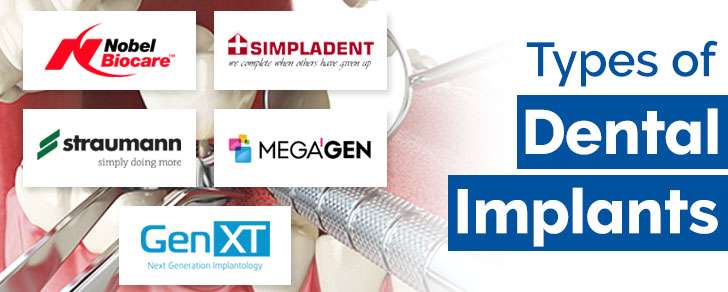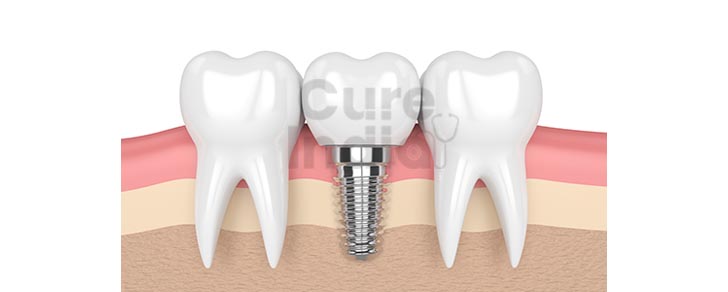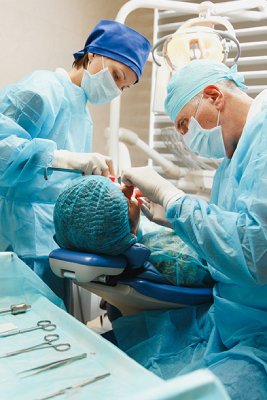

Before we get to know about the types of dental implants in India, let’s understand what dental implants are & what are they made of?
Dental Implant is a surgical procedure in which the tooth is replaced with the metal posts or frames and is positioned beneath your jawline surgically. This allows the dentist to mount the teeth to bridge the gap between the widened teeth. Once surgically placed, dental implants are not visible. Different types of dental implants have different ways of implantation depending upon the condition and the time of the surgery.
Dental implants are made of titanium – a metal that is light, strong and biocompatible and has all the properties of being accepted by the human body type as it is light, strong and biocompatible.

Titanium has a unique way of integrating itself to the bone when placed surgically called Osseointegration (“Osseo”– bone; “integration” – joining with) and serves as the vital basis of any type of dental implant’s success. The loss of a tooth is accompanied by the loss of bone as well, thus with the application of types of dental implants, bones are stabilized at the same time. Because of the above-mentioned properties, titanium and its alloys are widely used metals for different types of dental implants & bone implant (orthopaedic & joint replacements).
Because of the properties mentioned above, Titanium and its alloys are one of the most widely used metals in several types of dental implants and bone implants (like orthopaedic joint replacements).



Dental Implants are an excellent alternative for those who are uncomfortable wearing the ordinary dentures that slip within the mouth due to poor bridging and fixing. The different types of dental implants work in a way that they fuse in the jawbone providing adequate support to the denture, so they remain intact, even when the person eats or speaks.
.jpg)
Types of Dental Implants on the basis of placement in the bone
According to the American Academy of Implant Dentistry (AAID), the main types of dental implants on the basis of placement in the jaw bone are:
• Endosteal Implant: These dental implants are made up of titanium and are the most commonly used type of implants and are placed in the jawbone.
• Subperiosteal Implant: These dental implants are placed under the gum or above the jawbone. This type of implant may be used in patients who do not have a healthy and adequate natural jawbone but can undergo dental implant procedure with bone graft.
Types of dental implants on the basis of time/visits required for Osseointegration of Implants into Jaw bone:
Recently, Immediate Loading Dental Implants have gained immense popularity amongst dental tourists. Patients with good jaw bone can have immediate loading implants just after extraction & permanent teeth within 3-5 days*. Patients with low bone density or volume can have Basal Implants that are placed & derive support from the basal bone for rehabilitation.
There is adequate long-term evidence that immediate implants in India have survival rates similar to delayed placement. Additionally, immediate implants also help in preserving the crestal bone and minimize the soft tissue changes in the aesthetic zone.
In full mouth rehabilitation, around ten implants are placed in the upper jaw and eight implants are placed and lower jaw. A permanent prosthetic denture of 14 Ceramic or Zirconia crowns is given for each jaw for full mouth rehabilitation.
Mini Dental Implants have the same structure as regular implants but are slightly smaller in form. The implants have two parts:
• A titanium post with a ball on the end
• A socket with a rubber O-ring that attaches the tooth to the post
These types of dental implants are placed in the jawbone by using the immediate loading technique. So, you don’t have to wait for months in order to get your restoration done. Further benefits of Mini Dental Implants are:
• Preserve the facial appearance
• Comfortable
• Improves the fit of dentures
• No need for adhesives or other bonding agents.
• High success rate
If your bone density is low and your doctor has told you that you are not the ideal candidate for dental implants. We have a solution to restore your smile.
The Zygomatic Implants are placed on each side of the maxilla in combination with 2-4 conventional implants in the anterior region. Patients with severe bone loss can choose Zygomatic Implants as they allow immediate restoration of teeth. It avoids the wait for multiple surgeries in order to restore the bone with grafting.
These types of dental implants can be placed with both two-stage and immediate loading protocols but are usually placed with the immediate loading protocol.
Basal Implants are placed in the basal bone with immediate loading technique within 3-5 days. These types of implants have gained immense popularity because of the higher success rates.
There are four basic types of basal implants in India:
• Screw Form
• Plate Form
• Disk Form
• Other Forms
.jpg)
BOI Implants: These are effective in the case of the thin jaw bone with insufficient bone height. The implant comprises abutment, neck, vertical shaft, crestal disk and basal disk. They are placed with immediate loading technique with faster recovery time. They are effective for restoring atrophied jaws as they don’t require extensive augmentation.
KOC® Implants: It is a single-piece implant made up of highly fracture-resistant titanium. With an apical compression thread & straight, flexible or angled solid abutment it is suitable for crowns, bridges and bar connectors.
BECES® Implants: These implants are made up of high-strength, biocompatible (Ti6Al4V) titanium alloy. They are suggested in the case of temporary implant placement in cases when final implantation is not yet possible or advisable.
BECES® N implants seal and compress the 1st cortical and divide the long axis of the implant favourably into two sections.
BECES® EX implants are placed with immediate loading technique with the basal support is sufficient. The anti-rotation projection of the implant provides more stability.
Some of the brands used for immediate loading implants:
Gen XT
Simpladent
(Scientifically documented for 20 years, with a 99% success rate: FDA)
Conventional Implants are also called two-visit or two-stage implants. In these types of dental implants, you need to visit your dentist twice. At the first visit, the placing of implants is done and a temporary restoration is used until the second visit. Your second visit is planned for 3 months for teeth restoration.
A conventional implant is also called a two-piece implant as it consists of a root component and a tooth component. The root component is the implant and is placed in the jaw bone and is connected with the tooth component with the tiny screws.
In All on 4 dental implants, the teeth are supported on ‘four’ dental implants. It is a cost-efficient and graft efficient solution that provides patients with a full-arch prosthetics on the day of surgery.
In All on 6 dental implants, the teeth are supported on 'six' dental implants. It is a cost-efficient and graft efficient solution that provides patients with full-arch prosthetics on the day of surgery.
All on 6 & All on 6 Dental Implants require two visits.
Placement of the implants will be done and the patient will be given a temporary denture. The patient will be in the prosthetic phase and has to wait for 3-6 months for osseointegration of the implants in the bone.
The final phase of conventional implants will be the creation and placement of your prosthetic tooth or teeth. A permanent prosthesis of 12 teeth in each of the jaws is given in All-on-4 and a prosthesis of 14 teeth in each jaw is given in case of All-on-6 technique.
The recovery time of this type of implants is 3-8 months, but once you’ve got your implants done you’ll be functioning sooner. From the very first day, the implants fuse to your bone and will promote the stability of the denture.
You should be extra gentle about oral care, it’s so important to keep your mouth clean as possible. Your doctor will prescribe a medicated rinse to keep the bacteria load down and help promote healing.
The most important things to remember during recovery are:
• Rest
• Pain Management
• Eating Soft Foods
Nobel Biocare
Straumann
Megagen
Cowellmedi
Osstem
The cost comprises the cost of crowns and implants. A lifetime warranty of implants is provided by CureIndia and free of cost replacement mechanical failure of implants.
GenXT - 8000 USD
Simpladent - 8000 USD
All-on-4/6 Nobel Biocare, Straumann - 9000 USD
All-on-4/6 Osstem, Megagen, Dentium - 8000 USD
Nobel Biocare, Straumann 700 USD
Osstem, Megagen, Dentium 600 USD
Simpladent, GenXT 600 USD
Apart from providing the best dental care to the patients who are coming miles for a smile to India, we provide complementary services like:
Rest Assured, when you go back home!
Dental Implants fix the most important part of your body: face, which is responsible for one's overall appearance. Once you decide to get your dental bridges, misplaced teeth or dentures fixed via these dental implants, there is a long list of advantages that follows.
• Better Appearance: The implants fuse and are not visible.
• Better Speech: With poor dentures and missing teeth, there can be a slip during a speech causing you to slur your words.
• Increased Comfort: Since the dental implants fix the jiggling dentures, one feels lesser discomfort with removable dentures.
• Easy Eating: With the dentures sliding up and down due to the movement of the jaw while eating, dental implants eliminate the problem completely.
• Self Confidence: Dental Implants improve your smile and make you feel better about yourself.
• Durability: Dental Implants are not a temporary solution. They stay for many years provided good oral hygiene is implemented.
• Suitable: Dental Implants are very convenient in the way that they eliminate the need to remove your dentures every now and then. They also are a better alternative to the messy adhesives which are sometimes used to stick the dentures to the jawbone.
In general, dental implants have a success rate as high as 98%. If you take good care and maintain sufficient oral hygiene, dental implants could actually last a lifetime.
People who have sat through the Dental Implants surgery say that the procedure is very safe and only minor discomfort is caused. Local anaesthesia is injected before the surgery but is much less painful than a tooth extraction.
The mild soreness that may develop post the implant procedure may be treated medically by counter pain medicines (which your doctor will prescribe you).
The dental treatment in India has been coming to the forefront of the dental services offered globally. The dental expertise of dentists in India is exemplary. The dental treatment services are a little costly in comparison to another day to day treatments. However, the dental implant average cost in India is much lesser and reasonable if compared to any other country offering dental treatment services on the same scale of hospitality.


Globally Trusted Brands
Inquire Now
Get Permanent Teeth in 5 Days
Share Your OPG
Get The Smile You Want, Digitally
Get Invisalign